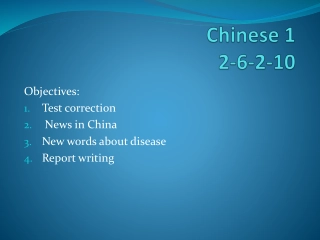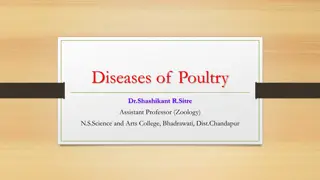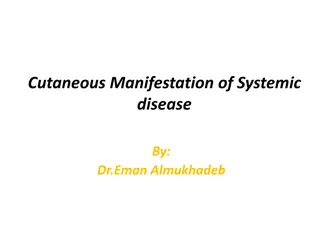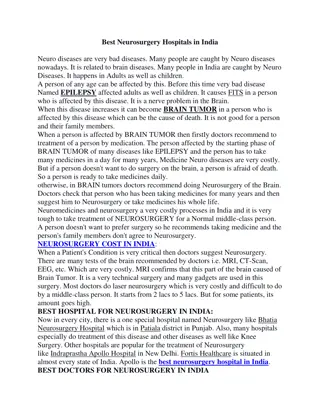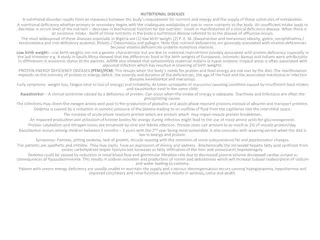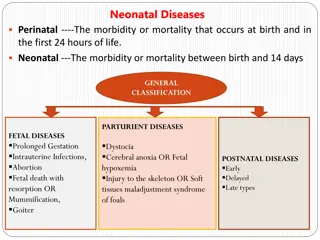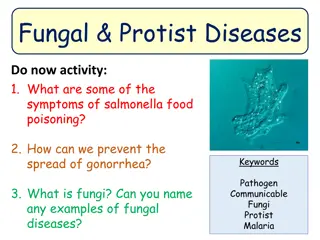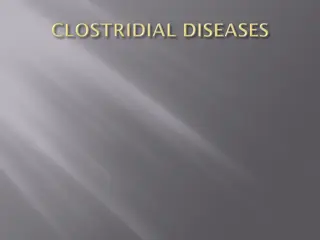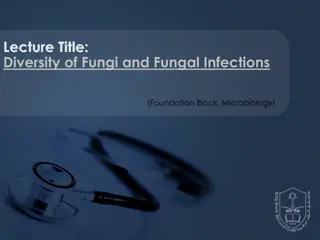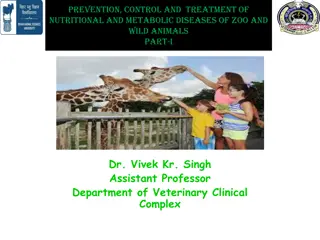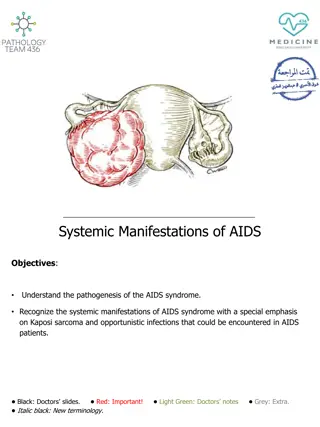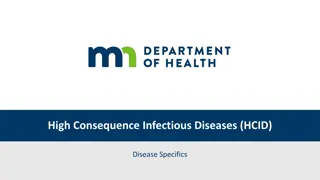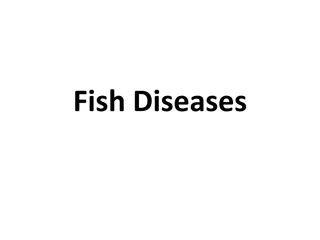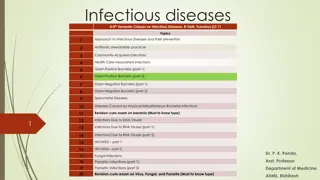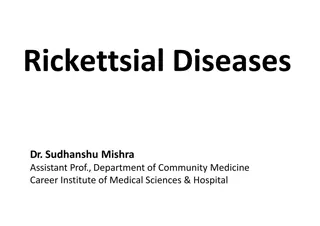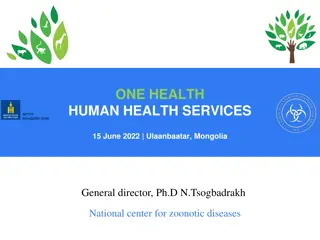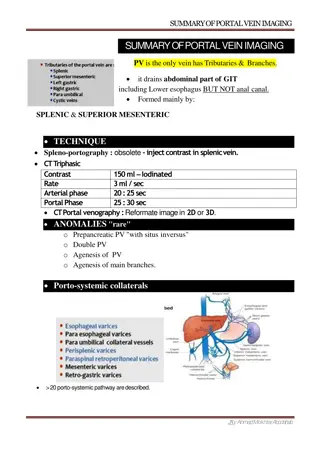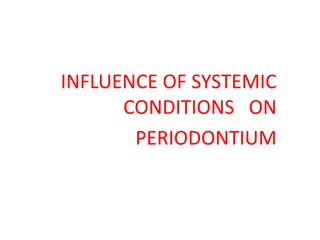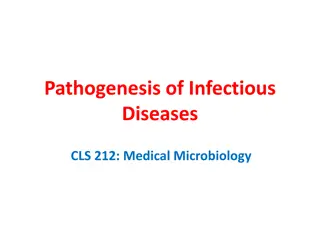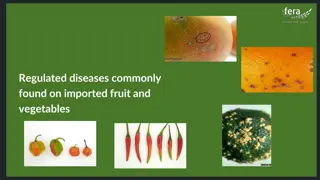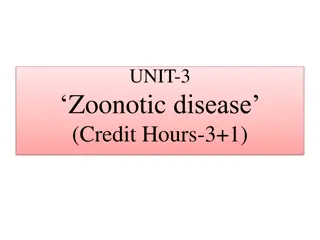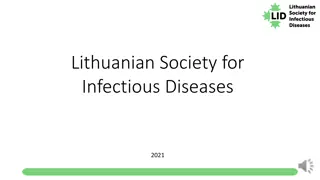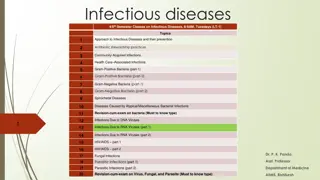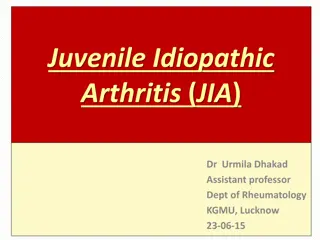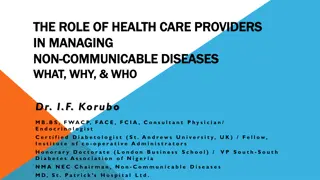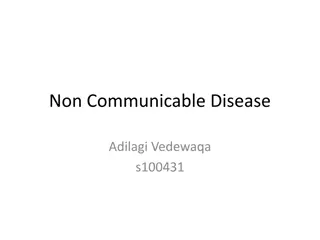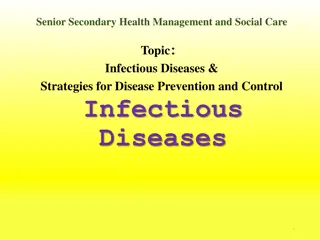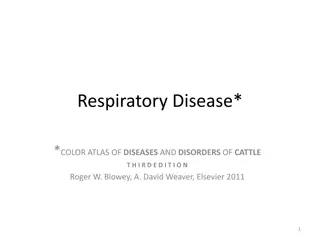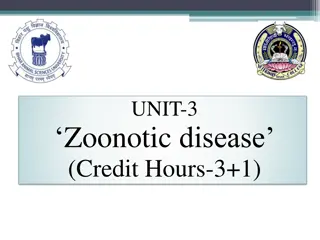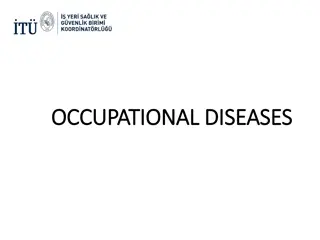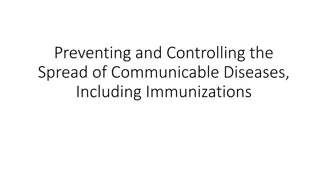Study Materials for Learning about Diseases and Telling Time
Dive into a collection of study resources covering test corrections, news updates from China, new vocabulary related to diseases, and report writing tasks. Explore new words, grammar rules for telling time, and objectives for each day of the week. Get insights on recent developments in China, includ
0 views • 13 slides
Overview of Poultry Diseases and their Causes
Poultry diseases caused by viruses and bacteria are a significant concern for poultry farmers. Viral diseases like Ranikhet Disease, Fowl Pox, and Avian Leucosis can have high mortality rates and severe symptoms. Bacterial diseases such as Tick Fever, Tuberculosis, Fowl Cholera, and Infectious Coryz
2 views • 12 slides
Prevalence of KIT D816V Mutation in Patients with Systemic Mast Cell Activation
This study presents findings from the PROSPECTOR clinical trial on the prevalence of the KIT D816V mutation in the peripheral blood of patients with systemic mast cell activation. The study involves multiple centers globally and sheds light on the significance of this mutation in systemic mastocytos
5 views • 14 slides
Periodontal Treatment Considerations for Medically Compromised Patients
Patients with significant medical conditions may require special considerations for periodontal treatment. Medical issues such as hemorrhagic disorders, renal diseases, liver diseases, pulmonary diseases, infectious diseases, pregnancy, medications, and cancer therapies can impact oral health and tr
1 views • 87 slides
Cutaneous Manifestations of Systemic Diseases: Endocrine Disorders and Diabetes Mellitus
Explore the cutaneous manifestations of systemic diseases, particularly focusing on endocrine disorders like diabetes mellitus. Learn about the dermatologic signs associated with conditions such as hypothyroidism, hyperthyroidism, Addison's disease, and Cushing syndrome. Discover specific manifestat
0 views • 88 slides
Best Neurosurgery Hospitals in India
Neuro diseases are very bad diseases. Many people are caught by Neuro diseases nowadays. It is related to brain diseases. Many people in India are caught by Neuro Diseases. It happens in Adults as well as children.\nA person of any age can be affected by this. Before this time very bad disease Named
1 views • 2 slides
Overview of Nutritional Diseases and Disorders
Nutritional diseases arise from imbalances between the body's nutrient and energy requirements and their supply. Nutritional deficiencies can lead to clinical diseases, while excessive intake can result in diseases of affluence. Common nutritional disorders include low birth weight, PEM, obesity, go
4 views • 6 slides
Neonatal Diseases
Neonatal and postnatal diseases in livestock, with a focus on perinatal, neonatal, and postnatal stages. It covers common classifications, causes, and risk factors associated with these diseases, particularly focusing on neonatal diarrhea (Calf Scour). The content delves into noninfectious and infec
0 views • 33 slides
Understanding Fungal and Protist Diseases: Impacts and Prevention
Fungi and protists play significant roles as pathogens, causing diseases in both humans and plants. Fungal diseases like athletes foot and protist diseases like malaria can have serious impacts on health. Control measures such as understanding symptoms, spread mechanisms, and prevention strategies a
0 views • 10 slides
Overview of Clostridial Diseases Caused by Clostridium Bacteria
Clostridial diseases are caused by bacteria of the genus Clostridium, which are anaerobes commonly found in soil, feces, and healthy animal tissues. These bacteria can lead to various diseases in animals such as black quarter, gas gangrene, necrotic dermatitis, and more. Understanding the different
0 views • 55 slides
Understanding Fungi Diversity and Infections in Microbiology
Explore the world of fungi and fungal infections in this foundation block of microbiology. Learn about medically important yeasts, mold fungi, major fungal diseases, antifungal agents, and infection acquisition methods. Dive into hypersensitivity reactions, mycotoxicoses, and various types of fungal
1 views • 19 slides
Managing Nutritional and Metabolic Diseases in Zoo and Wild Animals
The prevention, control, and treatment of nutritional and metabolic diseases in zoo and wild animals are essential for maintaining their health. These diseases, such as rickets, osteoporosis, osteomalacia, and fibrous osteodystrophy, can result from imbalances in dietary nutrients and metabolic dera
0 views • 10 slides
Understanding Systemic Manifestations of AIDS
Human Immunodeficiency Virus (HIV) is a retrovirus causing Acquired Immunodeficiency Syndrome (AIDS). HIV leads to immune system destruction, making individuals vulnerable to opportunistic infections and tumors. Common sexually transmitted diseases like syphilis, chlamydia, and gonorrhea are discuss
6 views • 15 slides
Understanding High Consequence Infectious Diseases (HCID)
High Consequence Infectious Diseases (HCID) encompass serious illnesses like Middle East Respiratory Syndrome (MERS), Ebola Virus Disease (EVD), and more. Patient screening for symptoms is crucial, and HCID is defined as diseases with high mortality rates and potential risks to healthcare personnel.
0 views • 70 slides
Understanding Fish Diseases and Health
Fish diseases and health are essential aspects of aquatic life. Diseases can be infectious or non-infectious, causing impairments to the normal state of fishes. Recognizing symptoms and signs of diseases is crucial for diagnosis and treatment. Overall, maintaining the health of fishes is vital for t
0 views • 21 slides
Infectious Diseases 4/5th Semester Classes: Approach & Prevention
Infectious Diseases class focuses on various topics including Antibiotic Stewardship Practices, Community-Acquired Infections, Gram-Positive and Gram-Negative Bacteria, Spirochetal Diseases, Diseases Caused by Bacterial and Viral Infections, HIV/AIDS, Fungal and Parasitic Infections. The class also
3 views • 30 slides
Overview of Rickettsial Diseases: History, Transmission, and Impact
Rickettsial diseases are caused by small, intracellular parasites primarily transmitted by arthropod vectors. This overview covers the history of these diseases, their transmission, the genera involved, and key historical events such as their impact during wars. Understanding rickettsial diseases is
0 views • 54 slides
Zoonotic Diseases in Mongolia: A One Health Perspective
High risk of zoonosis in Mongolia is evident due to various factors such as livestock practices, wildlife diseases, and environmental changes. The National Center for Zoonotic Diseases in Mongolia plays a crucial role in studying, preventing, and raising awareness about over 160 zoonotic infectious
0 views • 13 slides
Fighting Systemic Discrimination Through Litigation: A Legal Perspective
This content delves into the crucial role of litigation in combatting systemic discrimination, particularly in the context of under-representation of women in male-dominated work environments. It emphasizes the need for multiple strategies, including legal action, to address discriminatory barriers
0 views • 15 slides
Oral Manifestations of Systemic Diseases in Dentistry
This content explores various systemic diseases and their oral manifestations relevant to dentistry. It covers associations between heart disease and periodontal disease, effects of chronic corticosteroid use on the pulmonary system, endocrine disorders like diabetes and thyroid issues, autoimmune d
1 views • 63 slides
Portal Vein Imaging Techniques and Anomalies Overview
Portal vein imaging is crucial for evaluating conditions affecting the abdominal part of the gastrointestinal tract. Techniques such as spleno-portography and CT triphasic contrast imaging are used to visualize the portal vein and diagnose anomalies like portal-systemic collaterals and porto-systemi
4 views • 7 slides
Influence of Systemic Conditions on Periodontium
Systemic diseases, disorders, and conditions can affect the periodontium by impairing the host's barrier function and immunity, leading to periodontal destruction. Endocrine disorders like diabetes mellitus and hormonal changes, as well as female sex hormones during puberty, menstruation, pregnancy,
0 views • 20 slides
Understanding the Connection Between Oral Health and Systemic Diseases
The relationship between oral health and systemic diseases is significant, with manifestations within the oral cavity providing clues to underlying systemic issues. Disease processes involve aspects like etiology, pathogenesis, morphologic changes, and clinical significance. Organisms and toxins spr
0 views • 19 slides
Overview of Pathogenesis in Infectious Diseases
This content provides valuable information on the pathogenesis of infectious diseases, including definitions, phases of disease progression, types of infections, acute vs. chronic diseases, signs vs. symptoms, steps in pathogenesis, and ways pathogens can enter the body. It discusses the importance
0 views • 15 slides
Analyzing Systemic Climate Risk in the Financial Sector
This study discusses systemic climate risk in the financial sector by examining the effects of climate risks on financial institutions. It aims to design a market-based framework to assess the vulnerability of financial institutions to climate risks and analyze potential contagion effects. The frame
0 views • 39 slides
Managing and Preventing Diseases in Pig Farming
Proper temperature regulation, ventilation, hygiene practices, and feeding are essential in reducing the risk of diseases among pigs. Indoor farming allows control over these factors but also poses a challenge if diseases do occur, potentially leading to rapid spread and significant economic losses
0 views • 8 slides
Common Regulated Diseases in Imported Fruit and Vegetables
Imported fruit and vegetables can carry regulated diseases such as Citrus Black Spot, Citrus Scab, and Citrus Canker. These diseases affect citrus fruits and peppers, causing scabs, spots, and cankers, making the produce unmarketable. The pathogens causing these diseases have been intercepted in imp
0 views • 12 slides
Understanding Prion Diseases: A Comprehensive Overview
Prion diseases, such as Transmissible Spongiform Encephalopathies (TSEs), are rare and fatal neurological disorders affecting both humans and animals. These diseases are characterized by long incubation periods, neuronal loss, and the absence of an inflammatory response. Caused by abnormal folding o
0 views • 12 slides
Lithuanian Society for Infectious Diseases: Advancing Infectious Diseases Diagnostics, Treatment, and Prevention
Lithuanian Society for Infectious Diseases is a non-profit organization in Lithuania that brings together healthcare professionals to improve the diagnosis, treatment, and prevention of infectious diseases. They participate in various initiatives, events, and collaborations, organize conferences, an
0 views • 7 slides
Understanding Infectious Diseases: Approach, Prevention, and Viral Agents
Infectious diseases play a significant role in public health, with a focus on antibiotic stewardship, community-acquired and healthcare-associated infections, as well as various bacterial, viral, fungal, and parasitic agents. Specific topics include the prevention of infectious diseases, with a deta
0 views • 18 slides
Empowering Change: The Systemic Approach to Addressing Social Injustice
Explore the systemic change approach to combating unjust structures that oppress individuals living in poverty. Delve into understanding systems as interconnected wholes and the significance of systemic thinking in driving transformation. Uncover the complexities of social systems and the need to ac
0 views • 20 slides
Understanding Juvenile Idiopathic Arthritis (JIA) and Systemic Onset JIA (SOJIA)
Juvenile Idiopathic Arthritis (JIA) is arthritis of unknown origin that starts before the 16th birthday and lasts at least 6 weeks. It was previously known as juvenile rheumatoid arthritis (JRA). The diagnosis of JIA requires meeting specific criteria, and it can be classified into various subtypes
0 views • 52 slides
Managing Non-Communicable Diseases: Role of Health Care Providers
Non-communicable diseases (NCDs) like cardiovascular diseases, cancers, chronic respiratory diseases, and diabetes mellitus pose significant health challenges globally. This overview delves into the definition, epidemiology, and management strategies of NCDs, emphasizing the critical role of health
0 views • 18 slides
Understanding Non-Communicable Diseases and Global Action Plans
Non-communicable diseases (NCDs), such as cardiovascular diseases, cancers, chronic respiratory diseases, and diabetes, pose a major health threat globally, with 38 million deaths yearly. The Global Action Plan aims to reduce premature mortality from NCDs by 2025 through specific targets, including
0 views • 16 slides
Understanding Infectious Diseases and Prevention Strategies
Infectious diseases are caused by pathogens like bacteria, viruses, parasites, or fungi invading the body. These diseases can spread from person to person and sometimes from animals to humans. Common characteristics include potential severe outcomes, transmission modes, and the role of pathogens. Th
0 views • 27 slides
Respiratory Diseases in Cattle: Causes, Infections, and Management
Respiratory diseases in cattle primarily stem from infectious agents such as infectious bovine rhinotracheitis and Pasteurella spp. These diseases compromise the defense mechanisms of the body, leading to infections like pneumonia and pleuropneumonia. Viruses, mycoplasmas, and bacteria like Histophi
0 views • 31 slides
Understanding Zoonotic Diseases and Mycoses
Zoonotic diseases, caused by fungi, have the potential to affect both animals and humans and are often transmitted through various environmental factors. These diseases can lead to a range of conditions affecting different organs and structures of the body. Mycoses, such as superficial and systemic
0 views • 19 slides
Understanding Occupational Diseases and Prevention Methods
This detailed training covers basic concepts of occupational diseases, types, diagnostic methods, protection measures, statistics, and legal procedures. It emphasizes the preventable nature of occupational diseases and the importance of legal responsibilities. The visuals and statistics presented hi
0 views • 49 slides
Understanding and Preventing Communicable Diseases
Communicable diseases, also known as contagious or infectious diseases, are caused by germs such as viruses, bacteria, fungi, and parasites. These illnesses spread from person to person through various means like body fluids and can have different treatment approaches. It is essential to know how th
0 views • 34 slides
Accelerating Systemic Change Network Inaugural Workshop Overview
The Accelerating Systemic Change Network (ASCN) held its inaugural workshop in July 2016 at the Howard Hughes Medical Institute. The event focused on introducing ASCN, its goals, and working group topics to facilitate collaboration among change researchers in higher education. ASCN aims to be a prof
0 views • 22 slides
